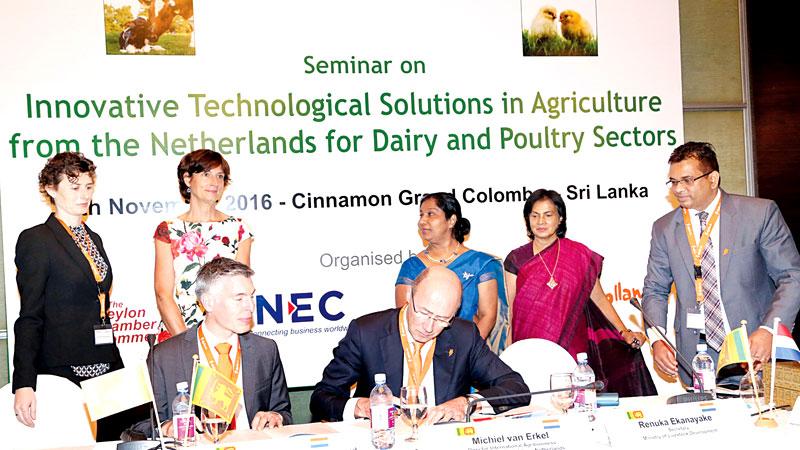
Dairy companies in the Netherlands, world-famous for its farming expertise and dairy products, entered into an agreement with Sri Lanka last week to modernize the country’s milk production value chains and to share technical skills to help local farmers build sustainable businesses.
 The Dutch dairy industry officials visiting the country said they had been successful in ensuring generations of dairy farmers remain in the industry and making it a dairy export powerhouse, having overcome obstacles similar to what Sri Lanka faces today where youth are shunning farm work in favour of white-collar jobs.
The Dutch dairy industry officials visiting the country said they had been successful in ensuring generations of dairy farmers remain in the industry and making it a dairy export powerhouse, having overcome obstacles similar to what Sri Lanka faces today where youth are shunning farm work in favour of white-collar jobs.
They did this by bringing in new concepts and strategies, varying from creating hi-tech jobs to professional and vocational training facilities and attractive income opportunities. A decline in the number of dairy farmers poses a challenge for the industry around the world, as well as consumers who need the products to meet basic nutrition requirements.
A Dutch dairy industry expert told journalists in Colombo last week of their experience in encouraging youngsters to remain on dairy farms. “We were successful in convincing young people that it was a thriving industry with many opportunities to grow, professionally and personally, while contributing immensely to the overall economy,” Director International Agribusiness, of the Ministry of Economic Affairs in the Netherlands, Michiel van Erkel said.
There was a time farming was not known as a ‘sexy job’ in the Netherlands, like how attitudes have changed in Sri Lanka today. “But now you can see most of the dairy industry jobs are hi-tech jobs.
There are educational opportunities for them to qualify as well,” he added. Michiel van Erkel was part of a leading Dutch business delegation which was in Colombo last week.
Dutch dairy businesses and knowledge institutes are eager to support Sri Lanka’s dairy industry by way of providing technical expertise, knowledge and training.
During their visit, the Dutch government officials and the Dutch businesses signed an agreement which confirms their commitment to support improving Sri Lanka’s dairy sector.
Program Manager, Internationalization of Wellantcollege, Jan Jeronimus said the agreement is aimed at fulfilling three main objectives; building the entire dairy production value chain, creating a sustainable, long-term business model, and sharing knowledge and technology support with the local industry.
He added that the Netherlands and Sri Lanka have quite similar dairy industry backgrounds.
“Dairy is a family-based business in the Netherlands; Sri Lanka’s situation is similar to the Netherlands.
Our model is already proven to be successful as the country has already become a key dairy industry in the world.”
The Netherlands is known as a dairy country and the Dutch dairy sector is an important part of their country’s economy with thousands of jobs and billions in revenue. Most Dutch dairy farmers co-own their dairy factory.
Family farming is the backbone of the dairy industry in the Netherlands and the dairy farmers have successfully positioned themselves in foreign markets through farmer-owned co-operatives.
Today the dairy farmers and milk processors work closely with research institutions and agricultural universities.
Companies are investing heavily in R&D, and several of the world’s leading dairy research institutes can be found in the Netherlands.
With the close cooperation between companies and these research institutes and with dairy companies putting their knowledge and technologies on the market, agro and food in the Netherlands is deservedly one of the country’s “top sectors”, according to reports from the Netherlands.
Answering a question on young peoples’ involvement in the sector from the Business Observer, Jeronimus said, “We need to convince them to survive and thrive in dairy. They should be told that their contributions are also to create a better, healthy society. It is quite a challenging task. But this needs to be done.”
Ambassador of the Netherlands, Joanne Doornewaard, said that the vision of the business delegation was not only to look for technology partnerships.
“The Netherlands is already a large investor in Sri Lanka. We continue to support, and invest in Sri Lanka.” As a world leader in the dairy sector, the Netherlands is keen to focus on dairy training and education, in addition to bringing in the technology.
